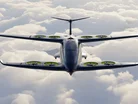Capgemini and Ascendance: Driving Hybrid Aviation Innovation

Capgemini and Ascendance, a leading manufacturer of aircraft and hybrid electric propulsion systems, have announced a vital extension of their strategic partnership.
This collaboration marks a new phase in their journey towards revolutionising the aviation industry, driven by an ambition to develop sustainable aviation powered by hybrid electric propulsion technology.
The aviation industry currently generates a staggering 13.9% of transport emissions, making the need for decarbonised air travel more urgent than ever.
"We are extremely pleased to expand our relationship with Ascendance," says William Rozé, CEO of Capgemini Engineering and Group Executive Board Member.
"After a successful first phase to support their innovative product development roadmap, we are now pivoting from technology demonstrations to industrialisation.
"Together, with Ascendance’s hybrid modular propulsion system and Capgemini’s end-to-end capabilities in critical engineering disciplines, digital and business transformation, we are ready to accelerate and soon deploy decarbonised solutions at scale for the aviation industry."
A commitment to hybrid electric propulsion technology
Since its inception in 2018, Ascendance has focused on developing innovative solutions to drive net-zero aviation.
The company’s approach centres around hybrid electric propulsion, a technology both scalable and applicable to various regional applications including passenger transport, medical services, logistics and surveillance.
One of Ascendance’s flagship innovations is the STERNA system, a modular hybrid propulsion system that enables the simultaneous use of multiple energy sources.
This breakthrough technology serves as the foundation for ATEA, Ascendance’s next-generation Vertical Take-Off and Landing (VTOL) aircraft.
Designed as a quieter, low-carbon alternative to helicopters, ATEA is set to have a marked impact on regional travel and transform the aviation industry.
The first flight of the ATEA prototype is set to take place in 2025, marking a significant milestone for Ascendance and sustainable aviation.
“We are thrilled to extend our partnership with Capgemini, together we have forged a strong relationship in recent years with many milestones achieved," says Jean-Christophe Lambert, CEO & Cofounder of Ascendance.
"Their expertise in engineering, data and industrialisation is crucial to accelerating the commercialisation of our hybrid propulsion solution STERNA and industrialisation of our aircraft ATEA.
"Together, we will contribute to making sustainable aviation more accessible, leveraging innovations that will reduce the carbon footprint of the aviation sector while offering new possibilities for the mobility of tomorrow."
The STERNA system serves as the foundation for ATEA, Ascendance’s next-generation Vertical Take-Off and Landing (VTOL) aircraft.
Designed as a quieter, low-carbon alternative to helicopters, ATEA is set to have a marked impact on regional travel and transform the aviation industry.
The first flight of the ATEA prototype is set to take place in 2025, marking a significant milestone for Ascendance and sustainable aviation.
Collaboration with Capgemini
Since 2021, Capgemini has been providing engineering expertise to Ascendance and supporting its journey towards certification.
Thanks to the collaboration Ascendance has evolved significantly, refining its approach to multiple technical disciplines.
These include system engineering, flight physics, control systems, power systems and battery development.
With Capgemini's support Ascendance has been able to accelerate the development of its aircraft and propulsion systems, moving closer to achieving the milestones necessary for commercialisation.
Both companies are pursuing hybrid electric propulsion as a pathway to sustainable aviation due to its capacity to maintain high levels of performance and efficiency whilst delivering significant reductions in emissions.
Accelerating industrialisation
Capgemini will also use its comprehensive capabilities to help accelerate the industrialisation phase of both the STERNA propulsion system and the ATEA aircraft.
This acceleration will focus on electric battery development, connected services, industrial ramp-up and digital continuity to ensure that Ascendance can meet growing demand for sustainable aviation solutions.
The extension of the partnership will see Capgemini bring its comprehensive capabilities to accelerate the industrialisation phase of both the STERNA propulsion system and the ATEA aircraft. Capgemini’s end-to-end capabilities in engineering, technology, data and business transformation will be key in scaling the production of both systems.
The collaboration will focus on areas such as electric battery development, connected services, industrial ramp-up and digital continuity, ensuring that Ascendance can meet the growing demand for sustainable aviation solutions.
This partnership exemplifies Capgemini’s ongoing commitment to supporting high-potential start-ups and promoting sustainability. It also aligns with the company’s broader strategy to help businesses transition to greener, more efficient practices.
By working together, Capgemini and Ascendance aim to not only revolutionise the aviation industry but also contribute to global efforts to reduce emissions and achieve net-zero goals.
Explore the latest edition of Manufacturing Digital and be part of the conversation at our global conference series, Manufacturing LIVE.
Sign up to our weekly newsletter here.
Discover all our upcoming events and secure your tickets today.
- Manufacturing the Future of Maritime Polar ExpeditionsSustainability & ESG
- The University Manufacturing Circuit Boards from LeavesSustainability & ESG
- Schneider Electric's Commitment to Sustainable ManufacturingSustainability & ESG
- Lenovo & Saudi Alat Building Green Manufacturing FacilitySustainability & ESG


